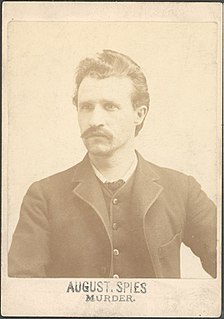A Quote by Martin Luther King, Jr.
The labor movement was the principal force that transformed misery and despair into hope and progress. Out of its bold struggles, economic and social reform gave birth to unemployment insurance, old age pensions, government relief for the destitute, and, above all, new wage levels that meant not mere survival but a tolerable life.
Related Quotes
Hope is a terrible thing, she said. Is it? Yes, it keep you living in another place, a place which doesn't exist. For some people it's better than where they are. For many it's a relief. From life, she said. A relief from life? Is that living? Some people don't have a choice. No and that's awful for them. Hope is better than misery, he said. Or despair. Hope belongs in the same box as despair. Hope is not so bad, he said. At least despair has truth to it.
Since it is to the advantage of the wage-payer to pay as little as possible, even well-paid labor will have no more than what is regarded in a particular society as the reasonable level of subsistence. The lower ranks of labor will commonly have less, and if public relief were afforded even up to the wage-level of the lowest ranks of labor, that relief would compete in the labor market; check or dry up the supply of wage-labor. It would tend to render the performance of work by the wage-earner redundant.
I've heard the argument that unemployment benefits somehow act as a disincentive to the long-term unemployed when it comes to looking for work, but the opposite is true. Unemployment Insurance serves as a powerful incentive for people to keep searching for jobs, rather than drop out of the labor force altogether.
There is no worse material poverty than one that does not allow for earning one’s bread and deprives one of the dignity of work. Youth unemployment, informality, and the lack of labor rights are not inevitable; they are the result of a previous social option, of an economic system that puts profit above man; if the profit is economic, to put it above humanity or above man, is the effect of a disposable culture that considers the human being in himself as a consumer good, which can be used and then discarded.
So much were employers of wage-labor unenthusiastic about proletarianization that, in addition to fostering the gender age division of labor, they also encouraged, in their employment patters and through their influence in the political arena, recognition of defined ethnic groups, seeking to link them to specific allocated roles in the labor-force, with different levels of real remuneration for their work. Ethnicity created a cultural crust which consolidated the patterns of semi-proletarian household structures.
To reverse the trend and reduce the role of government in our lives, and thus alleviate the government deficit and inflation pressures, is a giant educational task. The social and economic ideas that gave birth to the transfer system must be discredited and replaced with old values of individual independence and self-reliance. The social philosophy of individual freedom and unhampered private property must again be our guiding light.
But, if you think that by hanging us, you can stamp out the labor movement - the movement from which the downtrodden millions, the millions who toil and live in want and misery - the wage slaves - expect salvation - if this is your opinion, then hang us! Here you will tread upon a spark, but there, and there, and behind you and in front of you, and everywhere, flames will blaze up. It is a subterranean fire. You cannot put it out.








































